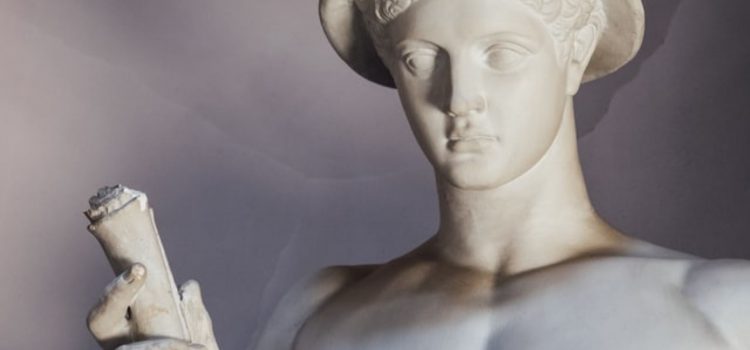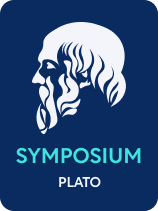

This article is an excerpt from the Shortform book guide to "Symposium" by Plato. Shortform has the world's best summaries and analyses of books you should be reading.
Like this article? Sign up for a free trial here .
What does Agathon say about love in Plato’s Symposium? Why does Socrates disagree with Agathon?
In Symposium, Agathon’s speech centers on Eros, the god of love, endowing him with three characteristics: Eros is beloved, Eros is an artist, and Eros is good. Socrates, however, disagrees with Agathon, arguing that Eros is a lover rather than a beloved.
Let’s examine the main ideas of Agathon’s description of Eros, as well as Socrates’s rebuttal and alternative description.
Descriptions of the God of Love
In Plato’s Symposium, Agathon’s speech approaches love in a new way—addressing not the benefits of love, but rather love itself: Eros, the god of love.
(Shortform note: To better understand the distinction Agathon makes between love and the god of love, let’s examine the Greek word for love that the Symposium uses: eros. Eros means love in the sense of passionate desire, usually in a sexual context (the English word “erotic” derives from eros). However, Eros is also the name of the god of love and sexual attraction—a god the Romans called Cupid. At the start of his speech, Agathon argues that the others only spoke of the feeling eros, rather than the god Eros. To make this difference clear, our guide will use Eros to describe the god, and “love” to describe the feeling—even though “eros” technically applies to both.)
Agathon’s Description of Eros
Agathon describes Eros as having many qualities—but these qualities tend to fall into three categories:
- Eros is beloved: Agathon describes Eros as a beloved—a creature of beauty, grace, and eternal youth who’s desired by others rather than being the desirer himself. Everyone desires Eros, but he surrounds himself only with other beautiful and soft things.
- Eros is an artist: Agreeing with Eryximachus that love can apply to all arts and skills, Agathon claims that Eros must be an expert at them all. Since love inspires people to become great artists, then the god of love must have talent himself to impart to others.
- Eros is good: Agathon suggests that love is incompatible with injustice or other evils—as a result, Eros is always fair, generous, and moral in his dealings and actions.
(Shortform note: Historical context helps to contextualize the ideas of Agathon’s speech. Agathon was a poet in ancient Athens known for his tragic plays and incredible physical beauty. He was also the beloved of Pausanias (who spoke earlier in the dialogue) in a relationship that ended up lasting 30 years (far longer than was typical of pederasty). Based on these details, scholars generally suggest that Agathon compares himself to Eros in his speech—he speaks of the great physical beauty and poetry of Eros, and of his virtue in relationships (something that Agathon’s lover Pausanias also discusses). By comparing himself to Eros, Agathon further cements his view that Eros is the beloved of a pederastic relationship.)
Socrates and Diotima’s Description of Eros
Socrates praises the beauty of Agathon’s speech, then politely informs him that everything he said was wrong. Then, Socrates gives his own speech on love. His speech mainly consists of him recounting a past conversation he had with a wise woman named Diotima. Diotima, he says, taught him everything he knows about love.
(Shortform note: In a dialogue primarily concerned with the intellectual and homoerotic lives of men, it might seem confusing that Socrates cites a woman for his views on love. Scholars suggest that Socrates cites Diotima as a way to gain credibility. Diotima speaks at length on childbirth, pregnancy, and reproduction (which we discuss later in the guide), all subjects strongly associated with women and femininity in ancient Athens. These scholars therefore suggest that Socrates (and perhaps Plato through him) uses Diotima to appeal to that perceived feminine “expertise” in his arguments.)
According to Diotima, Eros is not beloved, but rather is a lover—one that desires and seeks out beautiful things. Instead of a soft, youthful, and beautiful god, he’s an old, tough, and hardened spirit. He acts as a messenger between the humans and gods, delivering human prayers and offerings to the gods and divine instructions or blessings to humans.
(Shortform note: Plato evokes Socrates—an old, gnarled man seeking out beauty and wisdom—with this description of Eros. Plato’s works (and the Symposium in particular) are some of the only surviving descriptions of who Socrates was and what he was like—other descriptions include Aristophanes’s The Clouds (a comic play satirizing Socrates and his philosophy) and philosopher Xenophon’s dialogues. All three of these works present Socrates as absent-minded, unkempt, and more interested in knowledge than he is in the concrete world around him. By having Diotima describe Eros in a similar way, Plato implies that Socrates is the ideal erotic man—a claim that makes more sense once Diotima connects love and philosophy.)
To explain this conclusion, she further defines the act of loving and what it reveals about Eros.
What Loving Is
Diotima begins by describing the act of loving—after all, loving is by definition what Eros does. She reaches the following two conclusions:
- Love requires an object: Love only exists in relation to something else. For example: “Aristophanes loves wine.” Without the object, the sentence makes no sense: ”Aristophanes loves” doesn’t mean anything.
- People love what they don’t have: Loving an object means desiring it, and nobody would desire something they already have. If someone says they love something they have, it actually means they desire to continue having it.
(Shortform note: Some scholars suggest that because of these two conclusions, Plato presents a tragic view of love. By definition, Plato says we love what we don’t have and can never get—if we ever got the object of our love, then we’d either stop loving it or worry about losing it in the future. She suggests that those with an excess of such desires can often end up as tragic figures, with lives defined by longing, incompleteness, or a lack of satisfaction. As you read the rest of the guide, keep in mind how Plato’s view on love might create such a tragic figure—especially once we get to Alcibiades’s speech.)
What Eros Isn’t
Based on her conclusions about loving, Diotima outlines four things that Eros is not:
- Eros is not beautiful: Eros desires beauty, and people desire what they don’t have. Therefore, Eros isn’t beautiful.
- Eros is not good: All good things are beautiful—that’s why they’re attractive. Since Eros desires beauty, it follows that he desires good as well and therefore is not good himself.
- Eros is not wise: Wisdom is a good and beautiful quality, so Eros must desire it—and, therefore, lacks it.
- Eros is not a god: Gods are perfect beings that lack nothing—since Eros lacks beauty, goodness, and wisdom, it follows that he isn’t a god.
However, this doesn’t mean that Eros is ugly, bad, ignorant, and mortal—instead, he exists somewhere between all of these extremes. Someone who is entirely bad doesn’t desire goodness, and someone who is entirely ignorant is unaware of their ignorance and therefore doesn’t desire wisdom. Therefore, Eros has just enough wisdom and goodness to recognize what he doesn’t have—and to recognize that he wants it.

———End of Preview———
Like what you just read? Read the rest of the world's best book summary and analysis of Plato's "Symposium" at Shortform .
Here's what you'll find in our full Symposium summary :
- Plato’s philosophies on love, happiness, education, and reproduction
- Agathon’s description of Eros, the god of love
- What it means to love beauty itself






